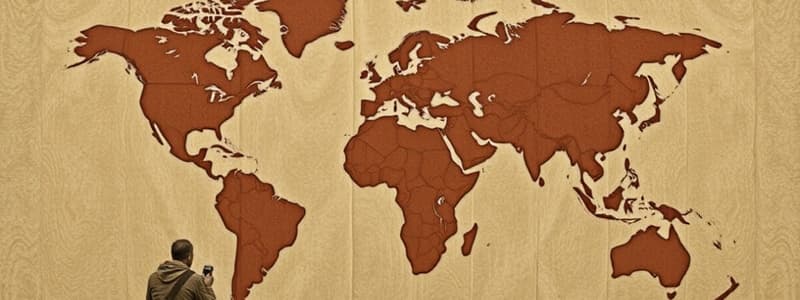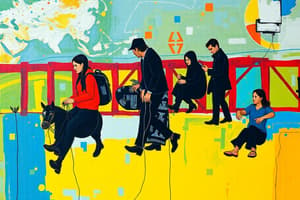Podcast
Questions and Answers
What factor is changing the role of the State in defining crime?
What factor is changing the role of the State in defining crime?
- Globalization (correct)
- Cultural shifts
- Economic factors
- Technological advancements
Criminal definitions are fixed and unchanging across different societies.
Criminal definitions are fixed and unchanging across different societies.
False (B)
Who stated that crime becomes a political category of blame?
Who stated that crime becomes a political category of blame?
Ruggiero
Some behaviors may be legally criminal but not considered __________ by public opinion.
Some behaviors may be legally criminal but not considered __________ by public opinion.
Match the following concepts with their descriptions:
Match the following concepts with their descriptions:
What type of social control aims to prevent deviant behavior before it occurs?
What type of social control aims to prevent deviant behavior before it occurs?
Female genital cutting is recognized as a human rights violation by international agencies.
Female genital cutting is recognized as a human rights violation by international agencies.
Define formal social control.
Define formal social control.
The process by which social order is maintained is known as ______.
The process by which social order is maintained is known as ______.
Which of the following practices is often subjected to international campaigns for criminalization?
Which of the following practices is often subjected to international campaigns for criminalization?
Informal social control includes mechanisms like early socialization and peer groups.
Informal social control includes mechanisms like early socialization and peer groups.
Criminal law primarily serves as a fundamental mechanism for exercising ______ social control.
Criminal law primarily serves as a fundamental mechanism for exercising ______ social control.
Which of the following best describes the legal-oriented definition of crime?
Which of the following best describes the legal-oriented definition of crime?
The sociological-oriented definition of crime views it as a static and unchangeable concept.
The sociological-oriented definition of crime views it as a static and unchangeable concept.
What does criminology study?
What does criminology study?
Criminology has no distinct theoretical object and no distinct method of inquiry, described as a __________ discipline.
Criminology has no distinct theoretical object and no distinct method of inquiry, described as a __________ discipline.
Match the terms related to criminology with their appropriate descriptions:
Match the terms related to criminology with their appropriate descriptions:
What was the main cause of the Fukushima disaster?
What was the main cause of the Fukushima disaster?
The estimated number of deaths due to contamination from the Chernobyl disaster ranges from 9,000 to 16,000.
The estimated number of deaths due to contamination from the Chernobyl disaster ranges from 9,000 to 16,000.
What date did the Chernobyl disaster occur?
What date did the Chernobyl disaster occur?
The radioactive cloud from Chernobyl spread into parts of the _______ and Western Europe.
The radioactive cloud from Chernobyl spread into parts of the _______ and Western Europe.
Match the following nuclear disasters with the year they occurred:
Match the following nuclear disasters with the year they occurred:
Which of the following best describes the actors involved in the criminalization process?
Which of the following best describes the actors involved in the criminalization process?
Criminalization only affects deviant behaviors that are universally recognized across all cultures.
Criminalization only affects deviant behaviors that are universally recognized across all cultures.
What is the main reason smoking has become less socially tolerated over time?
What is the main reason smoking has become less socially tolerated over time?
The criminalization process is selective because not all ______ behaviors are treated equally.
The criminalization process is selective because not all ______ behaviors are treated equally.
Match the following stages of smoking criminalization with their descriptions:
Match the following stages of smoking criminalization with their descriptions:
What is a primary factor that influences what is considered criminal?
What is a primary factor that influences what is considered criminal?
De-criminalization refers to the process of making previously legal behaviors illegal.
De-criminalization refers to the process of making previously legal behaviors illegal.
Name one actor involved in the punishment aspect of the criminalization process.
Name one actor involved in the punishment aspect of the criminalization process.
Flashcards
Criminology
Criminology
The study of crime as a social phenomenon, encompassing the creation of laws, law-breaking, and society's responses to law-breaking.
Crime
Crime
A behavior considered illegal and punishable by law. It's defined by legal codes and enforced by the criminal justice system.
Criminalization
Criminalization
The process of defining certain acts as criminal through laws, societal norms, and cultural values. It shapes what behaviors are considered deviant and punishable.
Social Control
Social Control
Signup and view all the flashcards
Harm
Harm
Signup and view all the flashcards
Relativity of Crime
Relativity of Crime
Signup and view all the flashcards
Selectivity of Crime
Selectivity of Crime
Signup and view all the flashcards
Criminalization Process
Criminalization Process
Signup and view all the flashcards
Historical Changeability of Crime Definitions
Historical Changeability of Crime Definitions
Signup and view all the flashcards
State's Role in Defining Crime
State's Role in Defining Crime
Signup and view all the flashcards
Crime as an Ideological Weapon
Crime as an Ideological Weapon
Signup and view all the flashcards
Globalization's Influence on Crime Definition
Globalization's Influence on Crime Definition
Signup and view all the flashcards
Gap Between Legal Definitions and Public Perceptions of Crime
Gap Between Legal Definitions and Public Perceptions of Crime
Signup and view all the flashcards
Criminalization as an outcome
Criminalization as an outcome
Signup and view all the flashcards
Criminalization as a practice
Criminalization as a practice
Signup and view all the flashcards
Criminalization: Selectivity and Relativity
Criminalization: Selectivity and Relativity
Signup and view all the flashcards
Actors in the Criminalization Process
Actors in the Criminalization Process
Signup and view all the flashcards
Criminalization of Smoking
Criminalization of Smoking
Signup and view all the flashcards
Public Opinion and Criminalization
Public Opinion and Criminalization
Signup and view all the flashcards
Public Morality and Criminalization
Public Morality and Criminalization
Signup and view all the flashcards
Worldwide criminalization
Worldwide criminalization
Signup and view all the flashcards
Formal social control
Formal social control
Signup and view all the flashcards
Deterrence
Deterrence
Signup and view all the flashcards
Informal social control
Informal social control
Signup and view all the flashcards
Informal sanctions
Informal sanctions
Signup and view all the flashcards
Chernobyl Disaster
Chernobyl Disaster
Signup and view all the flashcards
Fukushima Daiichi Nuclear Disaster
Fukushima Daiichi Nuclear Disaster
Signup and view all the flashcards
Disasters
Disasters
Signup and view all the flashcards
Study Notes
Global Crimes (Border Criminology)
- Course is taught by Valeria Ferraris
- Class meets Thursdays and Fridays, 2-4 PM
- Focuses on border criminology, analyzing global crimes
Basic Concepts
- Criminology: The body of knowledge regarding crime as a social phenomenon. It includes making laws, breaking laws, and reacting to law-breaking. (Edwin Sutherland)
- Crime/Criminalisation: Crime is a mutable social construction, contingent on legal, cultural, and social factors. The process of criminalizing certain actions varies.
- Social Control: Processes of maintaining social order through formal (e.g., criminal justice system) and informal (e.g., community norms) mechanisms.
- Harm: A concept related to, but distinct from, crime.
Criminology
- Criminology has no singular theoretical perspective or method of inquiry.
- It's a "rendez-vous discipline," drawing from various subjects.
What is a Crime?
- A QR code is shown for a participation platform (Wooclap)
- The method for accessing the platform is given (go to wooclap.com; enter event code)
- The definition of crime is debated
Definition of Crime
- Legal-Oriented (Criminal Law): A violation of the law subject to prosecution and punishment. Concentrates on the legal structure, content of laws, and judicial decision-making.
- Sociological-Oriented (Criminology): Crime is relative, evolving as cultural and social norms change. It focuses on the processes of criminalization and how criminal law develops over time.
What Is More Serious?
- Participation platform information is supplied (go to wooclap.com, enter event code)
- The code given is for participation.
Crime and Relativity
- Crime is not an objective entity but a socially constructed concept. Cultural, social, and historical forces shape how we see certain behaviors.
- Conventional crime categories don't encompass all harmful behaviors (e.g., white-collar crime, ecological crime, crimes of globalization).
- The concept of crime is relative, changing over time and varying by culture.
Crime and Relativity (Legal Rules)
- Some behaviors are legally criminal but not always considered criminal by public or common sense (and vice versa).
- Examples of such behaviors should be sought/provided by the student
Selectivity of Crime
- Meanings given to certain deviant acts depend on the social context.
- “Criminal” designation is given to particular social groups depending on the situation and time.
Criminalization Process
- Criminalization as a societal process involves legislative and judicial procedures, alongside public opinion and media influences. Actors involved in criminalization practices are many-including legislators, political parties etc.
- This process is selective because not all deviant behavior is treated the same (consider public opinion and formal legal structures). Public morality and media also influence and may bias perceptions.
- Criminalization is both an outcome (the result) of social processes and a practice (ongoing/ongoing actions).
Smoking: Steps of Criminalization
- Smoking is increasingly criminalized, particularly in developed countries.
- Factors include medical evidence showing health risks, harmful secondary smoke, and shift from public to private spheres.
- This process has occurred with different timing across nations.
Gender Related Crime: Steps of Criminalization
- Practices like female genital mutilation, forced marriage, and others are viewed as crimes by international bodies.
- These are considered human rights violations.
- There is variability in the acceptance of international campaigns to criminalize them.
Social Control
- Social control encompasses processes for maintaining social order; categorized into formal and informal types.
Formal Social Control
- Refers to formal means of control, using criminal justice system (e.g., law enforcement, courts)
- A key instrument of formal social control is deterrence.
Informal Social Control
- Based on factors like socialization at home and school, community influences, and peer groups.
Disasters or Crimes?
- Discusses the historical context around defining catastrophic events (e.g., nuclear disasters like Chernobyl or Fukushima) in legal and social frameworks.
Chernobyl and Fukushima
- Chernobyl (1986) and Fukushima (2011) are mentioned as examples of disasters and/or potential crimes.
Studying That Suits You
Use AI to generate personalized quizzes and flashcards to suit your learning preferences.
Related Documents
Description
This quiz explores the fundamental concepts of global crimes and border criminology as taught in the course by Valeria Ferraris. Participants will examine definitions, relationships, and social factors surrounding crime and criminalization. Test your understanding of social control, harm, and the complexities of criminological theory.




